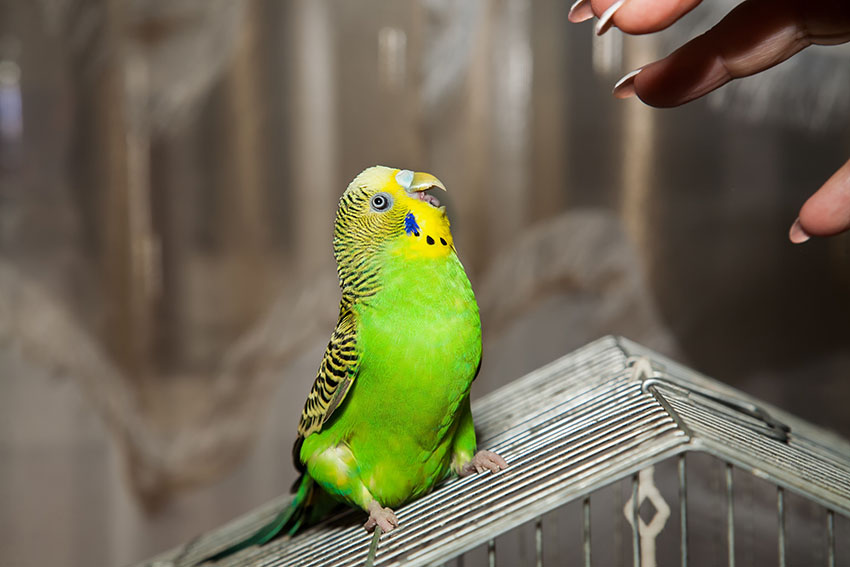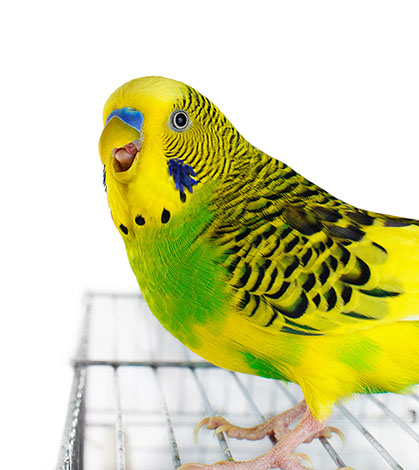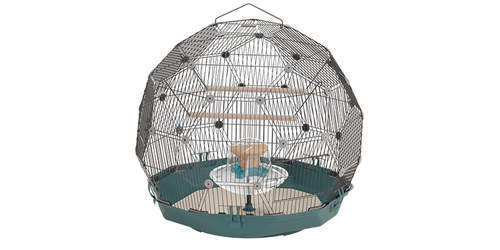Budgies are rarely aggressive by nature: their burst of temper will come and go quickly. They will fight over food, and will often clash briefly over friends, toys or territory; but this is all a normal part of budgie society. Ninety-nine percent of the time, this surface level of social aggression is to do with food, personal space or mating. A cock bird will jealously guard his hen during the nest-building and mating period. A hen bird will become territorial and relatively aggressive during this period, too. As long as things don’t get out of hand, it’s nothing to worry about.
If the birds’ aggression is focused on one increasingly intimidated individual, it may become necessary to separate them. On rare occasions this can happen when two birds are simply not compatible, for reasons we can’t fathom. This is unfortunate if they are your only two birds, but the only constructive thing to do is to cage them separately, and try to reintroduce them at a later date, first by putting the cages side by side and then, if that goes well, allowing them to cohabit once more.
With mating season testosterone bubbling in his brain, a dominant cock bird might try to make life miserable for his neighbours. Similarly, a hen with nesting on her mind may become short-tempered too. It’s important not to over-react in these circumstances – the birds' madness will disappear once the mating urge has passed, and as long as it’s not one timid bird taking all the grief, the flock will sort its problems out without you having to intervene. If a single bird is being bullied all the time, you may have to remove it while the aggressive one is attempting to be king or queen of the roost.

An aggressive bird will use his beak as a weapon
Budgie Dominant Behaviour
A dominant bird, whether cock or hen, will show aggression by squawking and biting. It will often raise its wings as it squawks – the kind of behaviour you encounter daily if you keep lots of budgies in an aviary and watch them taking their very uncivilised, bickering breakfast!
Spotting aggression in a budgie may be tricky for beginners, as the birds are often hyperactive, vocal and socialising physically without being aggressive. Here are some tell-tale signs to look out for:
- Raised wings – the budgie equivalent of raising your fists.
- Hissing – the throaty hiss of the budgie says “keep away!”
- Biting another bird’s feet – this is never done as part of a mutual grooming session, and is always meant aggressively.
- Picking at another bird’s feathers or head – if done gently, with a happy recipient, this is simply mutual grooming, which is what contented birds do. If the action is violent, you’re witnessing a fight. It will usually fizzle out once the less dominant bird has had enough and retreats.
- Chasing birds around the cage – if an aggressive bird pursues another individual for any length of time, you might have a problem on your hands. If this happens regularly, one of the two birds will need isolating for a week. Keep a close eye on the birds once they have been reintegrated.
- Not letting another bird eat or drink – small outbreaks of bad temper around food and water are normal. Providing more than one feeding station – or a sufficiently big one – usually sorts this problem out. If a budgie is going out of his way to keep another bird from feeding for any length of time, you have a similar problem to the chasing issue mentioned above.
- Targeting a new bird – a restocked flock will need to find its own balance. Keep an eye on behaviour, and only intervene if there is persistent, detrimental bullying. Jealousy may be an issue in a smaller cage set up – your established bird may resent the attention you are giving the newcomer. Keep the older bird happy with finger treats and attention, and his tantrum should subside.
- Defending a perch or food bowl – this is usually a symptom of overcrowding. Make sure you’ve given your birds enough space and provided plenty of different perches and bowls.

Budgies will defend their territory if the cage is overcrowded
- Biting your finger – your hand may become a target if inserted into an angry budgie’s cage, but a budgie’s beak (unlike larger members of the parrot family) cannot inflict much damage on an adult hand. Children might find it off-putting, however, if their beloved pet launches an attack on their inserted finger. Discourage them from interfering with a grumpy or dominant bird. If he’s been finger-trained, some gentle belly-stroking will often calm the budgie down, or he will hop onto your finger and nibble the spray of millet you’ve very thoughtfully wedged between your forefinger and thumb.




Comments
An Omleteer, 30 November 2023
I have 2 budgies male and female and they used to get along, now she laid eggs for the 2nd time and hes been really aggressive so we separated them and the male got out but hurt himself and we dont know what to do. someone reply and help us
Darren, 15 October 2023
I have two male budgies. They have been in the same cage together for around 4-5 months and things had seemingly been ok between them. However, recently one has been bullying the other a lot. He tends to follow the other everywhere he goes. He usually puts one claw onto the other, in a manner that is like trying to hold him down or in position and then starts pecking at him. It's like he is constantly trying to assert dominance. The other day the one who is being bullied had an injury to his face, next to one eye he had a cut which had obviously been bleeding. I am very concerned about this behaviour and don't know what to do. I am getting close to maybe finding a new home for the bully bird because I am worried he might do something awful if I let this go on.
An Omleteer, 4 October 2023
I have highly aggressive hens who will attack other hens to the point of blood, lost toes, etc. The cage itself is large, and always open. We don’t know who starts the fight most of the time, but the participants vary (making it hard to separate). Have had budgies for decades and never had this happen (or happen so often).
Kelly, 7 February 2023
Bragger, that is a great cage! May I ask where you got it? I have two male parakeets, both still fairly young. They have come from the same place but they were not in the same cage together (I’ve had them together, same cage, for 3 weeks). While they groom each other and get along most of the time, I do notice that one of them, the larger one, pushes the smaller one around periodically. I would love to have that cage just in case I do have to separate. I’ve been keeping a close eye out to see if it gets better for the little guy. Any recommendations are welcome.
Bragger, 1 January 2023
I am posting this to help anyone else right now. I have 2 males who share a fairly large cage. They are bonded brothers which I’ve had for 3 years. They used to be so close but unfortunately one has aggressively started to bully the timid one. I know it’s nature’s way and initially I thought it was hormonal and would pass. It got to the stage where the timid one was injured so I had to intervene. I purchased a cage 6 weeks ago which has a removable divider. This allows them to be close but with their own separate space. I’ve been closely monitoring them when they are together and sometimes are feeding each other and content but a short time later the dominant one starts again. Good luck to everyone.